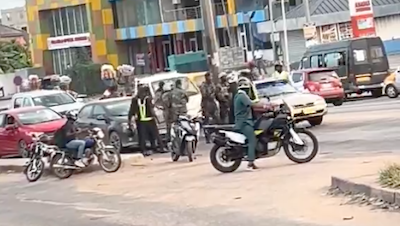A viral video from Accra has sparked nationwide attention as Ghana Armed Forces officers and traffic police were seen in a tense standoff on the streets.
In that startling scene on the streets of Accra, army officers and traffic police engaged in a heated confrontation over a non-emergency military convoy stuck in traffic. The incident, captured in a viral video, highlights a significant lack of coordination between Ghana’s security forces. Despite the absence of violence, the tension was palpable, drawing widespread attention online. This clash underscores the challenges of managing military and police interactions in urban settings, especially when traffic protocols are not clearly defined.
Accra Military vs Police Clash: Full Breakdown of What Really Happened on the Streets of Ghana [VIDEO]
The root of the conflict lies in the military’s traffic exemptions, which contrast with the police’s mandate to maintain order. While soldiers argued for priority passage, police officers insisted on adhering to standard traffic regulations. This standoff, though tense, did not escalate to physical altercations, but it revealed underlying issues of communication and protocol adherence. The incident has sparked discussions on the need for better inter-agency coordination to prevent similar escalations in the future.
In contrast, developed countries often handle such situations with established protocols that prioritize both military needs and public safety. Military convoys, even in non-emergency contexts, typically coordinate with local law enforcement to ensure smooth transit without causing significant disruptions. This approach relies heavily on pre-planned routes and real-time communication, ensuring that both parties are aware of each other’s actions and can adjust accordingly.
Effective management of such incidents in developed nations also involves rigorous training in de-escalation techniques and the use of technology like GPS tracking to monitor convoy movements. Designated liaison officers facilitate communication between military and police units, ensuring that any issues are resolved swiftly and amicably. These practices not only respect the urgency of military operations but also maintain public order, offering a model that Ghana could consider to avoid future clashes.
The Accra incident serves as a reminder of the importance of clear protocols and inter-agency cooperation. As Ghana continues to urbanize and traffic challenges grow, implementing similar strategies could prevent such confrontations, ensuring that both military and police forces work harmoniously to serve the public interest. This event, while unsettling, provides an opportunity to reassess and strengthen the frameworks that govern security operations in the city.



